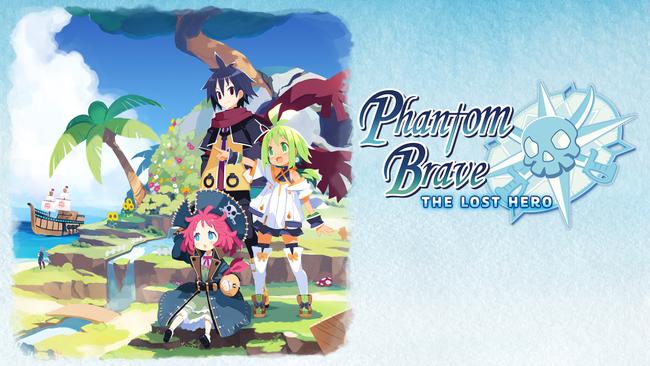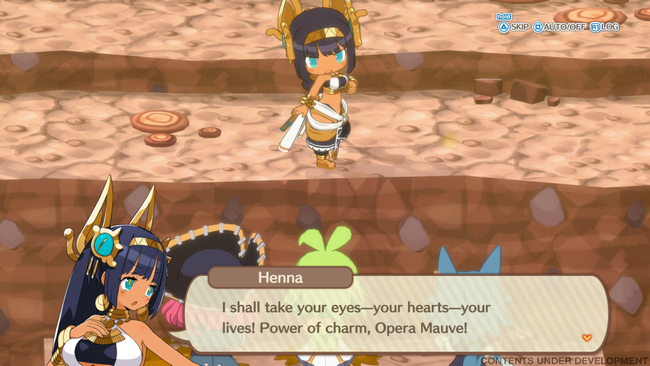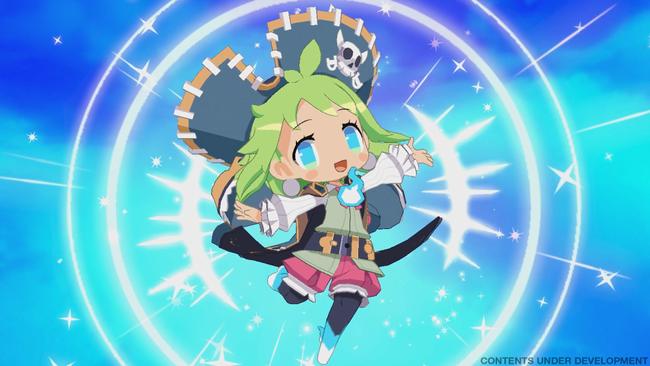
Kento Jobana speaks on Phantom Brave: The Lost Hero, death, rebirth and the supernatural
During Tokyo Game Show, Nippon-Ichi Software announced the release date for Phantom Brave: The Lost Hero - the sequel to 2004's PSP TRPG classic. At the same time, we had the chance to go hands-on with the game a second time, and sit down with the game's Scenario Writer - Kento Jobana. We discussed some of the challenges facing revisiting a series so many years later, themes of death and the supernatural in Nippon-Ichi Software's catalog of works, and more. Phantom Brave: The Lost Hero launches worldwide on January 30, 2025 forPlayStation 4, PlayStation 5 and Nintendo Switch. A PC release will come at a later date.
RPG Site: It feels like over the past decade, Nippon Ichi Software has had the habit of making a bunch of new IPs while older franchises have languished, outside of Disgaea. So, it's very interesting to see that Phantom Brave is returning - not even just for that, but also because it's a considerably lighter tone compared to the usual NIS fare. A little ironic, considering it's a series that closely deals with the departed. How has it been to return to that universe after 20 years?
Kento Jobana: I've been involved for Phantom Brave: The Lost Hero since the very beginning, I worked on every aspect of it since the start - and I was told by my superiors that this is a game that we want, as a company, to turn into another pillar - another face of the company - much like Disgaea is. That was the high level of expectation I was facing, and much as you said; this is a follow-up to a game from 20 years ago. In fact, at first I very specifically didn't want to tackle it, and I said as much. When I was commanded to handle the project's story, I even asked if I could try using a new set of main characters - which was denied. The owner of the company even went as far as to say that I was just running away from things, and that I needed to write a new story, with the returning characters. He was confident that I could deliver on that premise. So, ok - if that was the mandate, then I'll do it, but at the very least if we're bringing back these characters I didn't want to betray the fans' expectation - we needed them to be voiced by the original voice actors.

RPG Site: It sounds like it's been a fairly challenging situation for you, mandated as you were.
Kento Jobana: Yeah, so I basically got berated by the owner of the company that I had to find ways to work within those guidelines. So I ended up going back to basics, going back to the original game and the novelization that was also released in Japan. Approaching that with a fresh mind, I was able to see that there were some aspects of the original games story that remained unexplored. I was able to take these elements, and grow them, and work them into the story I have now. Actually, I've worked on a bunch of Disgaea games; but since Disgaea changes the main character every time, I've never really had to think about a character retaining their growth while still changing over time, across multiple games. So in the end, despite getting into a bit of trouble, I feel like it's been a good challenge for me as a scenario writer. It pushed me to do something new that I've never done before, and I appreciate it.
RPG Site: Now that you mention it, I would say it's a little unusual. In the past when NIS has released a sequel to an existing IP, most of the time that sequel does in fact follow a new set of characters, and a new point of view. In some cases it's even only tangentially related, such as how Labyrinth of Refrain and Labyrinth of Galleria are merely in the same multiverse as each other, but otherwise completely separate stories. In that sense, how do you balance introducing new characters while also trying to find ways to develop existing ones?
Kento Jobana: Let's start with the opposite end of your question. First, I took a look at the original while considering "What was it about the original Phantom Brave that fans loved?" I tried to approach it from the point of view of a fan; about what specifically they loved about this game. Fans love Marona. One thing about Marona is that she has this journey throughout the course of the game where she starts as someone ostracized, she's not well-liked, she's not really in a good position. Yet through the course of the game she grows and earns the affection of those around her. So, my first course of action - since I couldn't just have Marona retread the same story beats - was to create a new character, and figure out what I could do to have them grow like Marona did in the first game. This lead to Apricot.
Now on the other hand, for existing characters - I thought, "What should I do about them?" I ended up thinking about what aspects of Marona and Ash's relationship might not yet have been explored - so I decided to dig deeply into that. Finally, how do I make a new and wider cast of characters, and have them fit? Well, one thing that occurred to me was that while there were many Phantoms players could use in the original game, only Ash was ever actually a named focus. The story revolved around Ash and Marona; I realized that I had an opportunity to tell a new story by placing new characters, named Phantoms with their own personalities, at points of the game that could join Marona while depicting their own relationships. I figured this was the best way to balance the old and the new, and to set the stage for a continuing story.

RPG Site: Piggybacking off the latter half of that answer a bit - earlier during the press briefing, one particular character that stood out to me was a Phantom, Henna. She left behind a sister, who she's specifically been possessing. Having someone these Phantoms left behind feels like an interesting change of pace; what went into deciding this story hook for that section of the game?
Kento Jobana: Yeah, once I'd decided what we just talked about - that I wanted to focus on different Phantoms at different parts of the game - I started to think about it a bit more deeply, and I wondered "What do people think about when they pass away?" Phantoms are, of course, dead… so what types of things would keep them tethered to the world of the living? Whether it might be a child who passes away early, yearning for their mother, their family; or vice-versa. Anything that could drive a spirit to keep going without passing on, tying it to the world. I wanted to have a sense of drama within this world; I wanted it to be a dramatic tale. So, just looking at all these aspects of human life, and people passing away, I think, it's the most obvious and natural way to be able to implement it in this game; so that's where Henna's story came from.
RPG Site: It feels like death and the afterlife is a very common theme in NIS' stories. Not just with Disgaea, with it taking place in the Underworld, and we have Phantom Brave which deals with the departed. Yet, it feels like a theme that NIS likes to keep coming back to, when NIS creates new worlds, and stories to fit those worlds. Is there any particular reason you think the company is so enamored by the idea?
Kento Jobana: I guess we're a ton of strange people at NIS, we're a company who gathers a lot of people who are very interested in the darker side of life, the darker side of humanity, and things like that. You've got The Coven series with Izumi-san, the Yomawari series by Mizokami-san, and even if he's no longer at the company - obviously, the Disgaea series by Niikawa-san. All of these creators, these people had their own views about death and what happens afterwards. They all depicted it in their own unique ways. I, too, am very interested in things like that. In particular, I'm not just interested in stories about what ties humans to other humans, but also humans and their relationship to nature. To a spiritual, metaphysical level. For example; I'm a big fan of the movie Director Tim Burton; I love the way that he depicts some of those same aspects of life we're talking about, here. I feel a resonance there; I like to showcase humans in the natural world, and that sort of contact with the metaphysical, in another world beyond our own.

RPG Site: Wrapping it back around to this being the first entry in the Phantom Brave series in 20 years - not only will returning players have inevitably changed in the decades since, but inevitably you're going to have a ton of new players, treating this game like a brand new IP. Is there anything specifically you'd like to share to either end of that spectrum, about what you wanted to convey with The Last Hero?
Kento Jobana: So one of the first things I remember thinking when I took over writing for the Disgaea series was "What makes this series good?" One thing I remember feeling is that just by having the same environment around the development of the game as it was originally doesn't mean that you're going to create something that's loved or appreciated as much as the original game. Therefore, I wanted to think about what elements drew people to the series in the first place? What about Disgaea, specifically, did people like? That's the truly important thing. I believe I grasped those elements, so when I wrote Disgaea 7 I felt confident I had a good handle on it. Thankfully, it seems that players have felt the same way.
That's why, with Phantom Brave, I also went back to the drawing board to ask the same question, "What, specifically, do people like about Phantom Brave?" I'd like to hope that I've grasped that truth, as well. When you work on a game, it's important that there's a sense of freshness to it; you can't just rehash what has came before. It's by discovering the core of what makes these stories, these games so good that you can truly make something that does justice to the original while standing on its own as a new experience. For Phantom Brave, there's a sense of prestige to it, a pedigree. We could've just relied on nostalgia for The Lost Hero, but I hope that everything - both new and old - will be able to appeal to the full spectrum of players. On the one hand, fans of the series from a long time ago should be able to find those elements that they loved within it back then, and those picking it up for the first time should be able to appreciate the new.
Honestly speaking, despite this being a game with such a history - a lot of the test play has been handled by people who never actually played the previous game before, and all of them have reported that despite that baggage of being a true sequel they found it very easy to understand. We don't think you necessarily have to have played the first game to play the series for the first time; and in that sense, we feel like we succeeded. Beyond that, though, fans will be able to check it out for themselves - we'll have a demo releasing in the coming months, and if players do have any issues - let us know! I want to hear what both sets of players have to say, and I'll do my best to respond to that criticism - if that's what it ends up being. As it stands, I'm confident I was able to create something that upholds what made the series great to begin with, while offering that experience to everyone.